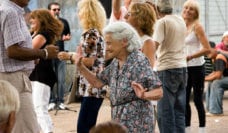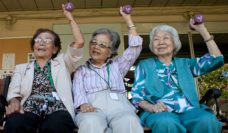Over the past few decades, the global fertility rate has decreased while life expectancy has steadily increased. As a result, 1 in every 5 US residents will be 65 or older by 2030. Older Americans will outnumber children for the first time in US history. Consequently, prioritizing healthy aging and ensuring high quality of life in old age is more important than ever.
Social integration, or how strongly a person is connected to a group, influences an individual’s ability to age well. In a recent study, researchers followed women participating in the Nurses’ Health Study for 16 years to understand the association between social integration in midlife and healthy aging. The study began when participants were aged 30 to 55 and assessed how four types of social connections impacted women’s health as they transitioned from midlife into their sixties. The social connections examined included: marital status, church group membership, membership in community organizations, and sociability (the number and frequency of contact with children, close relatives, and close friends).
Women who had more social connections in midlife were more likely to experience healthy aging than women who were socially isolated. Women were deemed to have aged well if they did not develop a major chronic disease and if they reported no impairments in memory, physical function, or mental health over the follow-up period. These outcomes aligned with the World Health Organization’s definition of healthy aging which is maintaining the mental and physical capacity necessary to do what one values in old age.
Programs that focus on social activities are particularly important because more than a fifth of adults in the United States report feelings of loneliness and social isolation.
Other research has also found associations between social integration and better physiological function, reduced risk of chronic diseases, dementia, and mortality. Interventions designed to promote healthy aging and wellbeing in older Americans often incorporate some form of social activity. For instance, the Program to Encourage Active, Rewarding Lives for Seniors, PEARLS, uses social engagement to help manage depression in older adults living with social isolation, multiple chronic medical problems and physical impairment. The WHO also recently developed a set of guidelines for community-level interventions that promote healthy aging. One recommendation highlighted family-style meals and social dining for older people who live alone or are socially isolated. Programs that focus on social activities are particularly important because more than a fifth of adults in the United States report feelings of loneliness and social isolation.
The health narrative of old age is usually centered on managing loss, be it physical, mental, or relational such as the loss of a spouse, or personal independence. But with more people living longer, practitioners are increasingly called to re-examine how can public health and health systems meet the needs of older Americans and better prepare them for quality living in their later years.
The concept of the life-course asserts that early life experiences influence health outcomes in later years. There is an increasing body of research supporting the importance of cultivating new relationships and keeping old relationships intact as ways to improve social integration and health as one ages.
Photo by Matthew Bennett on Unsplash














